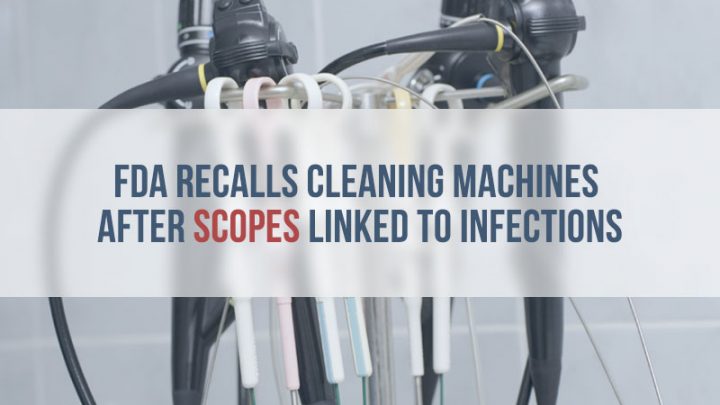FDA Recalls Cleaning Machines after Scopes Linked to Infections
Editors carefully fact-check all Drugwatch content for accuracy and quality.
Drugwatch has a stringent fact-checking process. It starts with our strict sourcing guidelines.
We only gather information from credible sources. This includes peer-reviewed medical journals, reputable media outlets, government reports, court records and interviews with qualified experts.

The U.S. Food and Drug Administration ordered a recall of machines used to clean medical scopes linked to superbug infections.
Custom Ultrasonics must recall about 2,800 machines used to clean endoscopes, because the company violated federal law with lapses that could increase the risk of transmitting infections, according to the FDA.
In recent years, superbug outbreaks caused by endoscopes led to 32 infections and 11 deaths at a Seattle hospital. In February 2015, the scopes led to around 200 infections and two deaths at a hospital at UCLA.
“We are taking action because Custom Ultrasonics failed to meet its legal and regulatory obligations,” said William Maisel, deputy director of the FDA Center for Devices and Radiological Health, in a press release. “The FDA’s recall order stemmed from the company’s continued violations of federal law and the consent decree and is necessary to protect the public health.”
The recall is the latest FDA action to try to prevent future superbug infections. Superbugs are infectious bacteria that are resistant to antibiotics and other treatments.
In August, the FDA warned endoscope manufacturers for marketing devices without receiving clearance, for providing inadequate cleaning instructions and for failing to report adverse events linked to the devices. Duodenoscopes, a type of endoscope, are used during hundreds of thousands of diagnostic procedures every year.
In October, the FDA ordered endoscope manufacturers to study the use of the devices in clinical settings. The recent orders come amid growing legal activity regarding superbug infections.
Numerous people who developed superbug infections after surgery involving endoscopes filed lawsuits against endoscope manufacturers. They claim the companies sold the devices without FDA clearance and knowingly sold faulty products.
FDA Orders Scope Manufacturers to Conduct Safety Studies
The November recall comes a little more than a month after the FDA ordered three duodenoscope manufacturers to conduct surveillance studies.
“This is a significant step in the effort to combat infections spread through duodenoscopes,” Maisel said in October. “The FDA has undertaken an in-depth investigation into the factors that may play a role in infection transmission associated with duodenoscopes, and is now requiring manufacturers to study the devices in the clinical setting where they are being used.”
Manufacturers included Olympus, Fujifilm Medical Systems and Hoya Corp. The FDA hopes the manufacturers will be able to provide data that can be used to help improve the safety of the devices.
“These studies will provide critical information about the effectiveness of current reprocessing instructions and practices that may provide additional information to inform the FDA’s actions to protect the public health and help reduce the risk of infections,” Maisel said.
Study Finds 60% of CRE Infections Result in Long-Term Care
An October study published in the Journal of the American Medical Association found a deadly type of superbug called carbapenem-resistant enterobacteriaceae (CRE) affected only 2.93 out of every 100,000 people studied in seven U.S. communities.
The infection rate was much lower than a more well-known superbug called methicillin-resistant staphylococcus aureus (MRSA) which infects 25.1 out of every 100,000 people.
The bad news is people infected with CRE had a 60 percent chance of being transferred to a long-term care facility. Health care facilities are where superbugs tend to spread the most, and the study found the majority of cases studied involved patients with prior hospitalizations.
There are few treatments available to treat CRE infections, which results in high mortality (death) rates.
The FDA acknowledged a lack of perfect cleaning techniques for duodenoscopes, but the devices are necessary for certain procedures. The agency issued guidance for best practices for sanitizing the devices to reduce the risk of spreading infections.
The recall of Custom Ultrasonics’ faulty cleaning machines is the latest in the FDA’s efforts to reduce the superbug transmission risk.